Ethics and Law for Nurse Managers: Analysis and Application
VerifiedAdded on 2022/10/04
|5
|1028
|28
Homework Assignment
AI Summary
This assignment solution addresses key ethical and legal considerations for nurse managers. It covers topics such as implied consent in various nursing interventions, the need for explicit consent when sharing patient information, and the principle of beneficence and its conflicts. The document also explores informed consent procedures in emergency situations and for children, as well as the balance between respecting patient autonomy and ensuring patient safety. Finally, it discusses the ethical considerations of allowing student nurses to participate in patient care. The assignment draws upon various scholarly sources to support its arguments and provide a comprehensive overview of ethical and legal issues in nursing management.
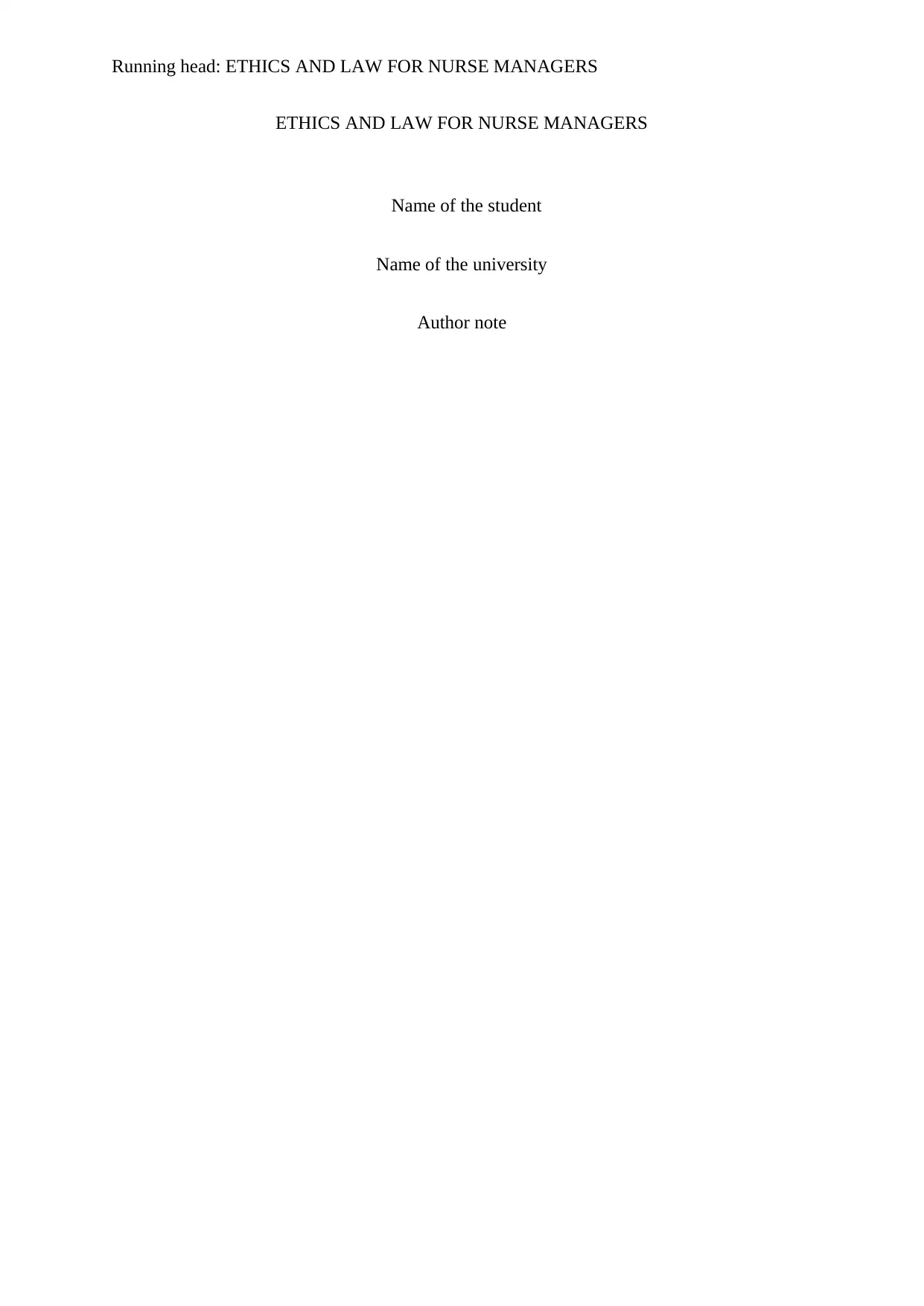
Running head: ETHICS AND LAW FOR NURSE MANAGERS
ETHICS AND LAW FOR NURSE MANAGERS
Name of the student
Name of the university
Author note
ETHICS AND LAW FOR NURSE MANAGERS
Name of the student
Name of the university
Author note
Paraphrase This Document
Need a fresh take? Get an instant paraphrase of this document with our AI Paraphraser
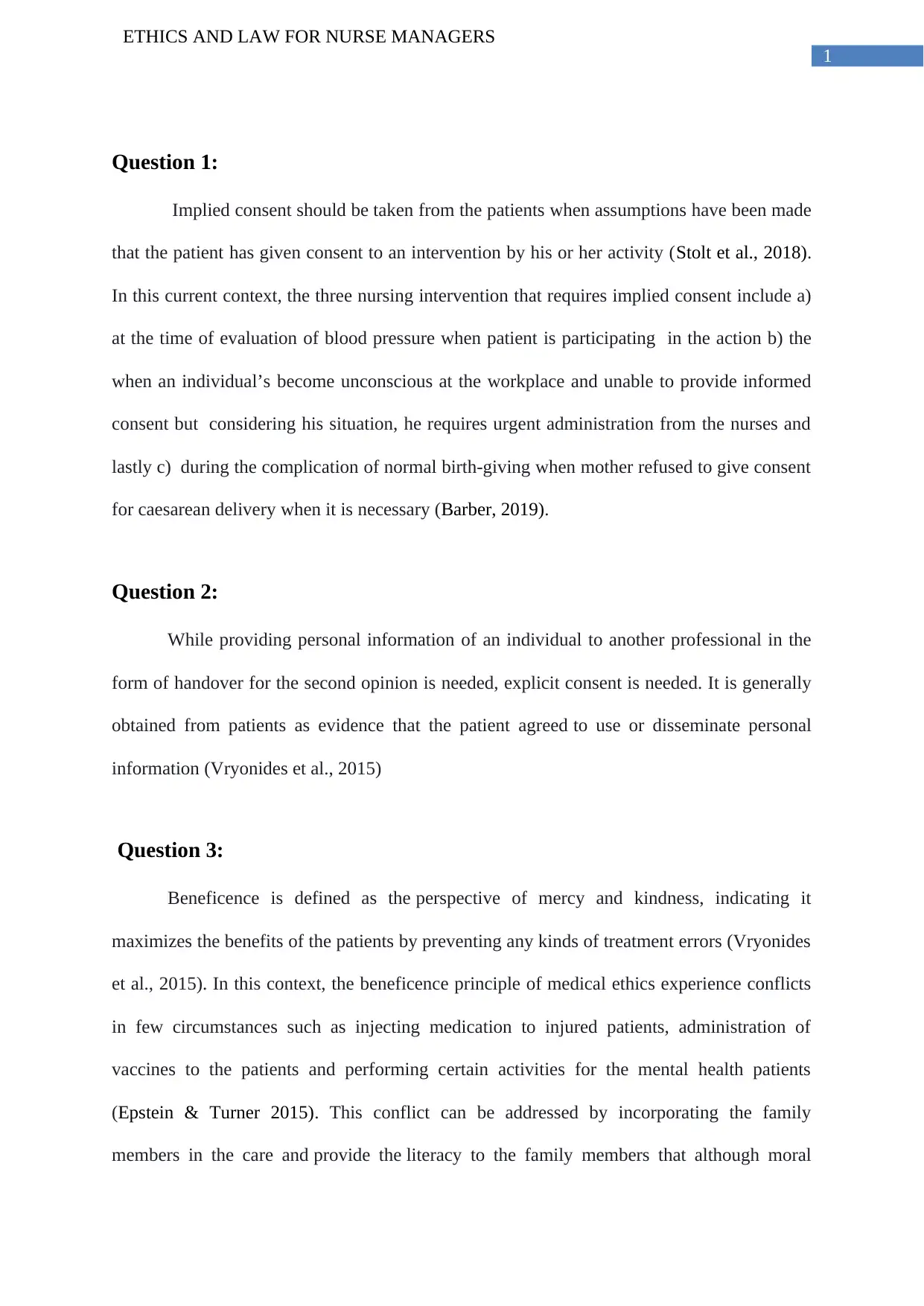
1
ETHICS AND LAW FOR NURSE MANAGERS
Question 1:
Implied consent should be taken from the patients when assumptions have been made
that the patient has given consent to an intervention by his or her activity (Stolt et al., 2018).
In this current context, the three nursing intervention that requires implied consent include a)
at the time of evaluation of blood pressure when patient is participating in the action b) the
when an individual’s become unconscious at the workplace and unable to provide informed
consent but considering his situation, he requires urgent administration from the nurses and
lastly c) during the complication of normal birth-giving when mother refused to give consent
for caesarean delivery when it is necessary (Barber, 2019).
Question 2:
While providing personal information of an individual to another professional in the
form of handover for the second opinion is needed, explicit consent is needed. It is generally
obtained from patients as evidence that the patient agreed to use or disseminate personal
information (Vryonides et al., 2015)
Question 3:
Beneficence is defined as the perspective of mercy and kindness, indicating it
maximizes the benefits of the patients by preventing any kinds of treatment errors (Vryonides
et al., 2015). In this context, the beneficence principle of medical ethics experience conflicts
in few circumstances such as injecting medication to injured patients, administration of
vaccines to the patients and performing certain activities for the mental health patients
(Epstein & Turner 2015). This conflict can be addressed by incorporating the family
members in the care and provide the literacy to the family members that although moral
ETHICS AND LAW FOR NURSE MANAGERS
Question 1:
Implied consent should be taken from the patients when assumptions have been made
that the patient has given consent to an intervention by his or her activity (Stolt et al., 2018).
In this current context, the three nursing intervention that requires implied consent include a)
at the time of evaluation of blood pressure when patient is participating in the action b) the
when an individual’s become unconscious at the workplace and unable to provide informed
consent but considering his situation, he requires urgent administration from the nurses and
lastly c) during the complication of normal birth-giving when mother refused to give consent
for caesarean delivery when it is necessary (Barber, 2019).
Question 2:
While providing personal information of an individual to another professional in the
form of handover for the second opinion is needed, explicit consent is needed. It is generally
obtained from patients as evidence that the patient agreed to use or disseminate personal
information (Vryonides et al., 2015)
Question 3:
Beneficence is defined as the perspective of mercy and kindness, indicating it
maximizes the benefits of the patients by preventing any kinds of treatment errors (Vryonides
et al., 2015). In this context, the beneficence principle of medical ethics experience conflicts
in few circumstances such as injecting medication to injured patients, administration of
vaccines to the patients and performing certain activities for the mental health patients
(Epstein & Turner 2015). This conflict can be addressed by incorporating the family
members in the care and provide the literacy to the family members that although moral
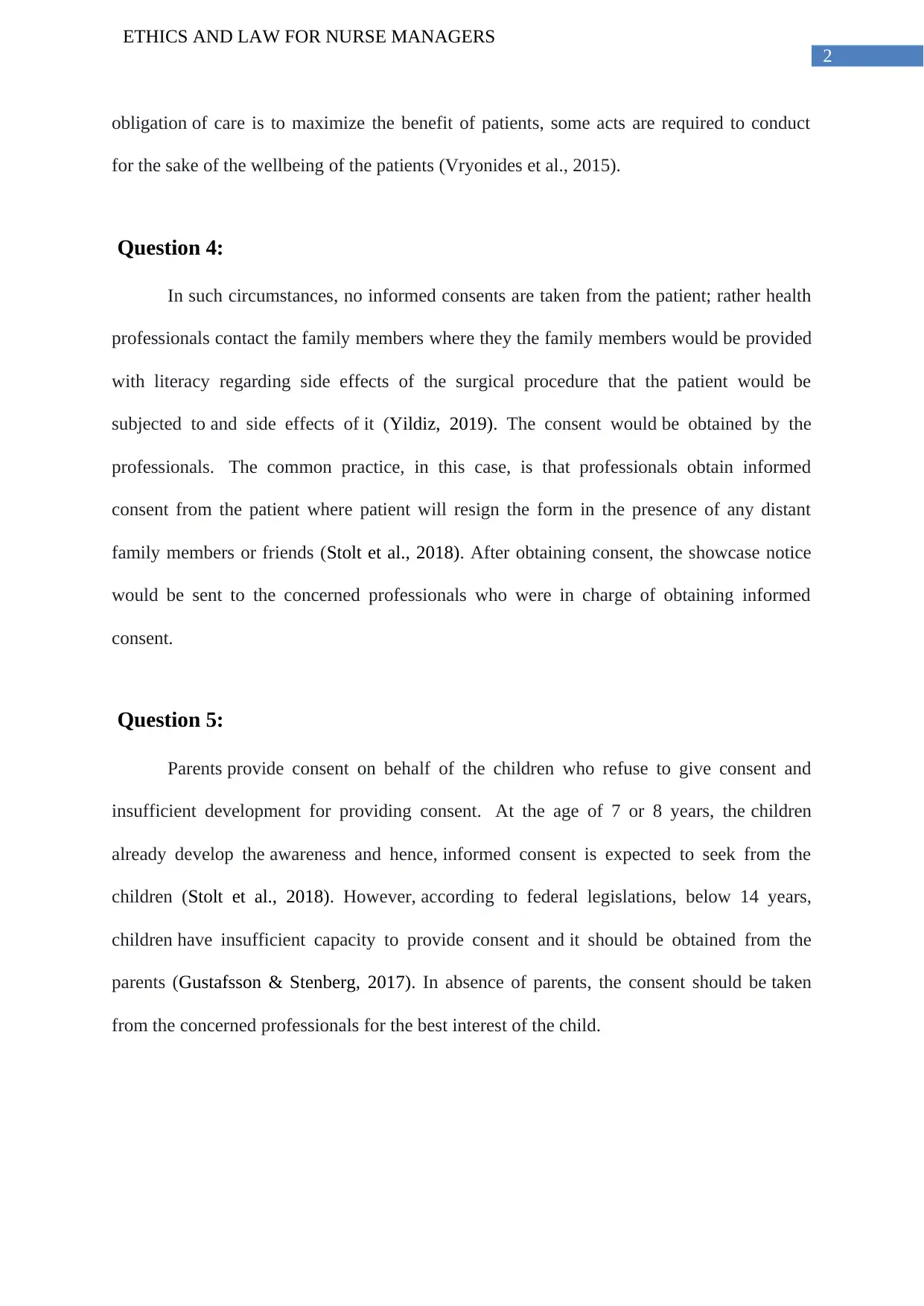
2
ETHICS AND LAW FOR NURSE MANAGERS
obligation of care is to maximize the benefit of patients, some acts are required to conduct
for the sake of the wellbeing of the patients (Vryonides et al., 2015).
Question 4:
In such circumstances, no informed consents are taken from the patient; rather health
professionals contact the family members where they the family members would be provided
with literacy regarding side effects of the surgical procedure that the patient would be
subjected to and side effects of it (Yildiz, 2019). The consent would be obtained by the
professionals. The common practice, in this case, is that professionals obtain informed
consent from the patient where patient will resign the form in the presence of any distant
family members or friends (Stolt et al., 2018). After obtaining consent, the showcase notice
would be sent to the concerned professionals who were in charge of obtaining informed
consent.
Question 5:
Parents provide consent on behalf of the children who refuse to give consent and
insufficient development for providing consent. At the age of 7 or 8 years, the children
already develop the awareness and hence, informed consent is expected to seek from the
children (Stolt et al., 2018). However, according to federal legislations, below 14 years,
children have insufficient capacity to provide consent and it should be obtained from the
parents (Gustafsson & Stenberg, 2017). In absence of parents, the consent should be taken
from the concerned professionals for the best interest of the child.
ETHICS AND LAW FOR NURSE MANAGERS
obligation of care is to maximize the benefit of patients, some acts are required to conduct
for the sake of the wellbeing of the patients (Vryonides et al., 2015).
Question 4:
In such circumstances, no informed consents are taken from the patient; rather health
professionals contact the family members where they the family members would be provided
with literacy regarding side effects of the surgical procedure that the patient would be
subjected to and side effects of it (Yildiz, 2019). The consent would be obtained by the
professionals. The common practice, in this case, is that professionals obtain informed
consent from the patient where patient will resign the form in the presence of any distant
family members or friends (Stolt et al., 2018). After obtaining consent, the showcase notice
would be sent to the concerned professionals who were in charge of obtaining informed
consent.
Question 5:
Parents provide consent on behalf of the children who refuse to give consent and
insufficient development for providing consent. At the age of 7 or 8 years, the children
already develop the awareness and hence, informed consent is expected to seek from the
children (Stolt et al., 2018). However, according to federal legislations, below 14 years,
children have insufficient capacity to provide consent and it should be obtained from the
parents (Gustafsson & Stenberg, 2017). In absence of parents, the consent should be taken
from the concerned professionals for the best interest of the child.
⊘ This is a preview!⊘
Do you want full access?
Subscribe today to unlock all pages.

Trusted by 1+ million students worldwide
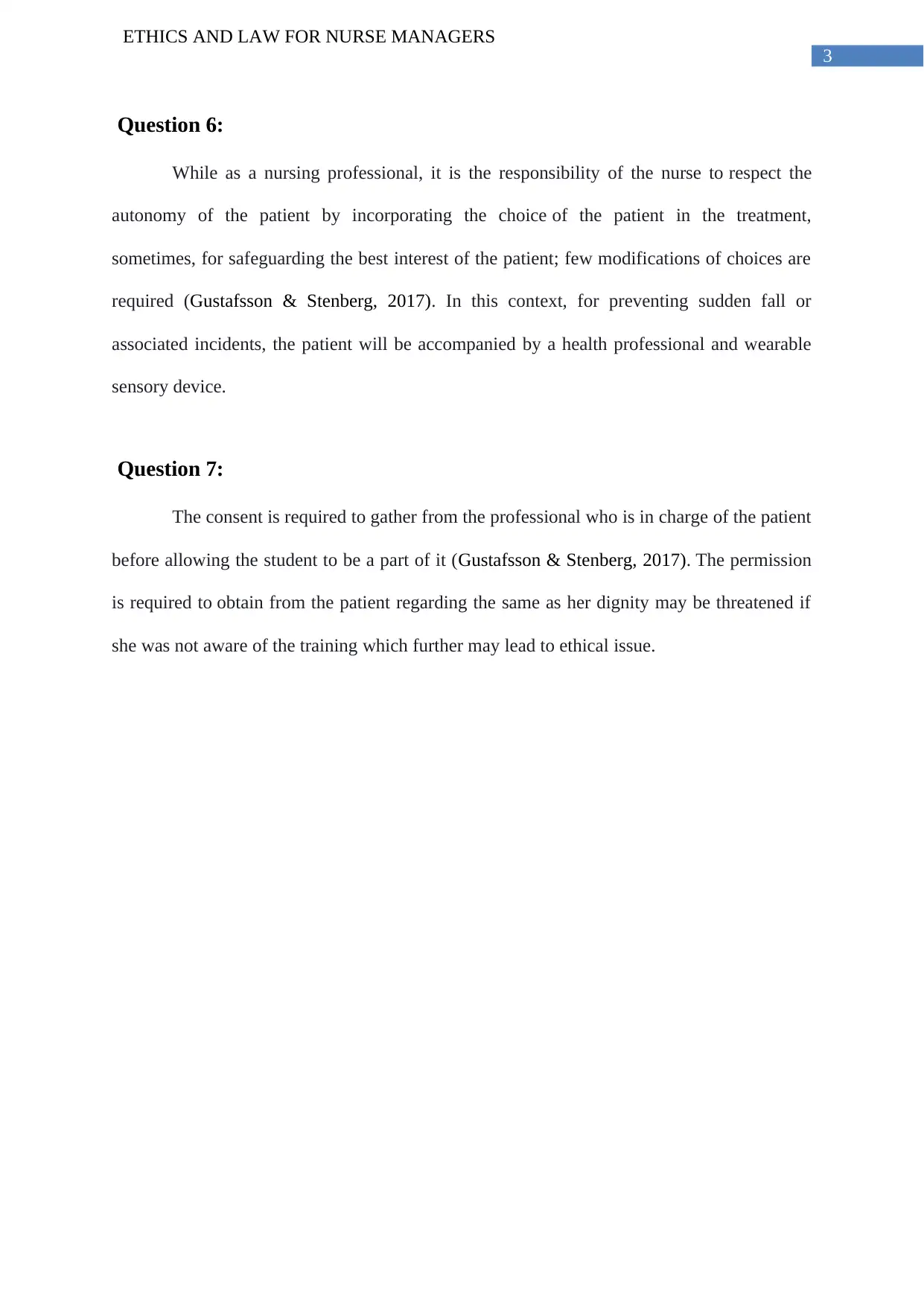
3
ETHICS AND LAW FOR NURSE MANAGERS
Question 6:
While as a nursing professional, it is the responsibility of the nurse to respect the
autonomy of the patient by incorporating the choice of the patient in the treatment,
sometimes, for safeguarding the best interest of the patient; few modifications of choices are
required (Gustafsson & Stenberg, 2017). In this context, for preventing sudden fall or
associated incidents, the patient will be accompanied by a health professional and wearable
sensory device.
Question 7:
The consent is required to gather from the professional who is in charge of the patient
before allowing the student to be a part of it (Gustafsson & Stenberg, 2017). The permission
is required to obtain from the patient regarding the same as her dignity may be threatened if
she was not aware of the training which further may lead to ethical issue.
ETHICS AND LAW FOR NURSE MANAGERS
Question 6:
While as a nursing professional, it is the responsibility of the nurse to respect the
autonomy of the patient by incorporating the choice of the patient in the treatment,
sometimes, for safeguarding the best interest of the patient; few modifications of choices are
required (Gustafsson & Stenberg, 2017). In this context, for preventing sudden fall or
associated incidents, the patient will be accompanied by a health professional and wearable
sensory device.
Question 7:
The consent is required to gather from the professional who is in charge of the patient
before allowing the student to be a part of it (Gustafsson & Stenberg, 2017). The permission
is required to obtain from the patient regarding the same as her dignity may be threatened if
she was not aware of the training which further may lead to ethical issue.
Paraphrase This Document
Need a fresh take? Get an instant paraphrase of this document with our AI Paraphraser
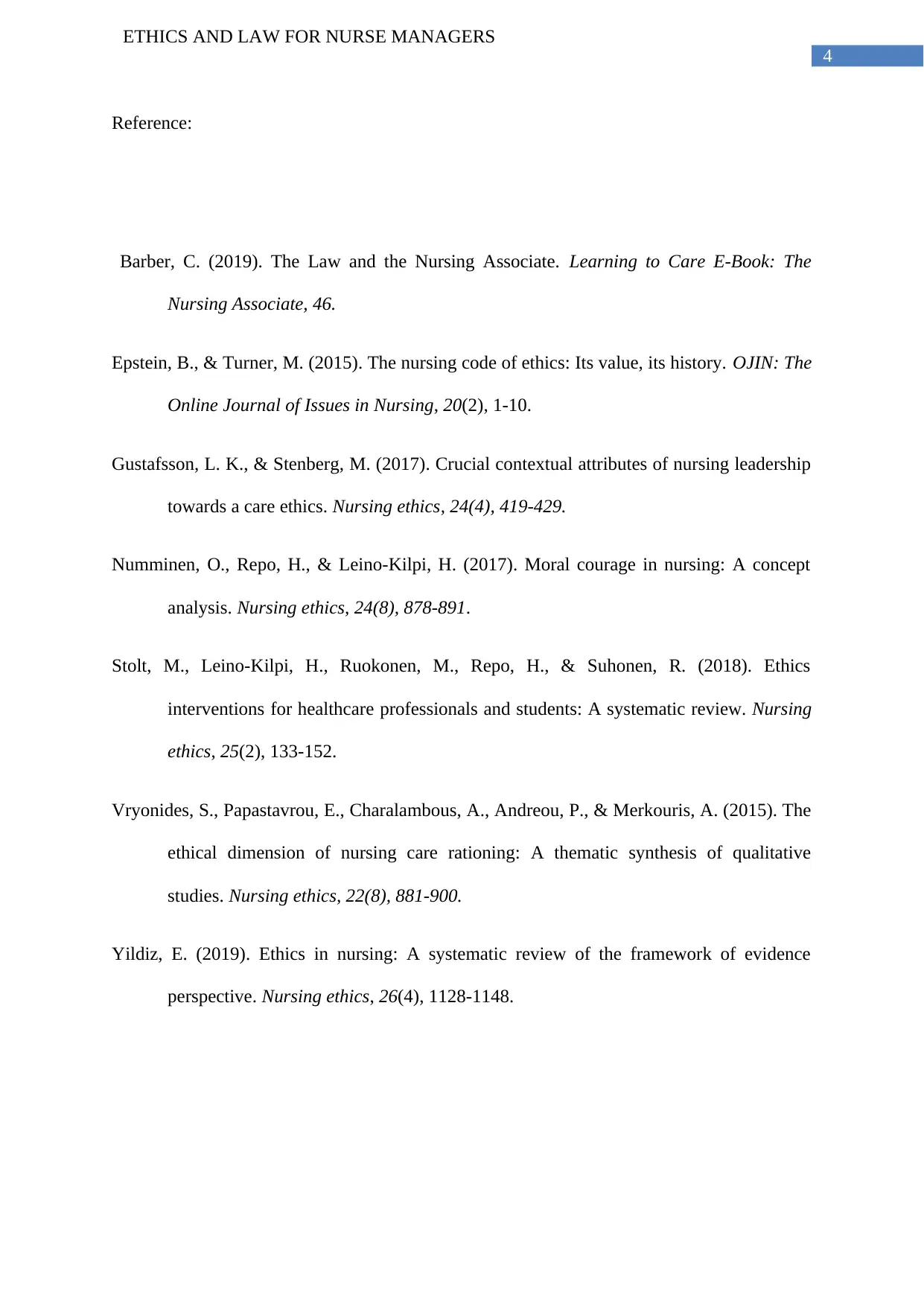
4
ETHICS AND LAW FOR NURSE MANAGERS
Reference:
Barber, C. (2019). The Law and the Nursing Associate. Learning to Care E-Book: The
Nursing Associate, 46.
Epstein, B., & Turner, M. (2015). The nursing code of ethics: Its value, its history. OJIN: The
Online Journal of Issues in Nursing, 20(2), 1-10.
Gustafsson, L. K., & Stenberg, M. (2017). Crucial contextual attributes of nursing leadership
towards a care ethics. Nursing ethics, 24(4), 419-429.
Numminen, O., Repo, H., & Leino-Kilpi, H. (2017). Moral courage in nursing: A concept
analysis. Nursing ethics, 24(8), 878-891.
Stolt, M., Leino-Kilpi, H., Ruokonen, M., Repo, H., & Suhonen, R. (2018). Ethics
interventions for healthcare professionals and students: A systematic review. Nursing
ethics, 25(2), 133-152.
Vryonides, S., Papastavrou, E., Charalambous, A., Andreou, P., & Merkouris, A. (2015). The
ethical dimension of nursing care rationing: A thematic synthesis of qualitative
studies. Nursing ethics, 22(8), 881-900.
Yildiz, E. (2019). Ethics in nursing: A systematic review of the framework of evidence
perspective. Nursing ethics, 26(4), 1128-1148.
ETHICS AND LAW FOR NURSE MANAGERS
Reference:
Barber, C. (2019). The Law and the Nursing Associate. Learning to Care E-Book: The
Nursing Associate, 46.
Epstein, B., & Turner, M. (2015). The nursing code of ethics: Its value, its history. OJIN: The
Online Journal of Issues in Nursing, 20(2), 1-10.
Gustafsson, L. K., & Stenberg, M. (2017). Crucial contextual attributes of nursing leadership
towards a care ethics. Nursing ethics, 24(4), 419-429.
Numminen, O., Repo, H., & Leino-Kilpi, H. (2017). Moral courage in nursing: A concept
analysis. Nursing ethics, 24(8), 878-891.
Stolt, M., Leino-Kilpi, H., Ruokonen, M., Repo, H., & Suhonen, R. (2018). Ethics
interventions for healthcare professionals and students: A systematic review. Nursing
ethics, 25(2), 133-152.
Vryonides, S., Papastavrou, E., Charalambous, A., Andreou, P., & Merkouris, A. (2015). The
ethical dimension of nursing care rationing: A thematic synthesis of qualitative
studies. Nursing ethics, 22(8), 881-900.
Yildiz, E. (2019). Ethics in nursing: A systematic review of the framework of evidence
perspective. Nursing ethics, 26(4), 1128-1148.
1 out of 5
Related Documents
Your All-in-One AI-Powered Toolkit for Academic Success.
+13062052269
info@desklib.com
Available 24*7 on WhatsApp / Email
![[object Object]](/_next/static/media/star-bottom.7253800d.svg)
Unlock your academic potential
Copyright © 2020–2026 A2Z Services. All Rights Reserved. Developed and managed by ZUCOL.





